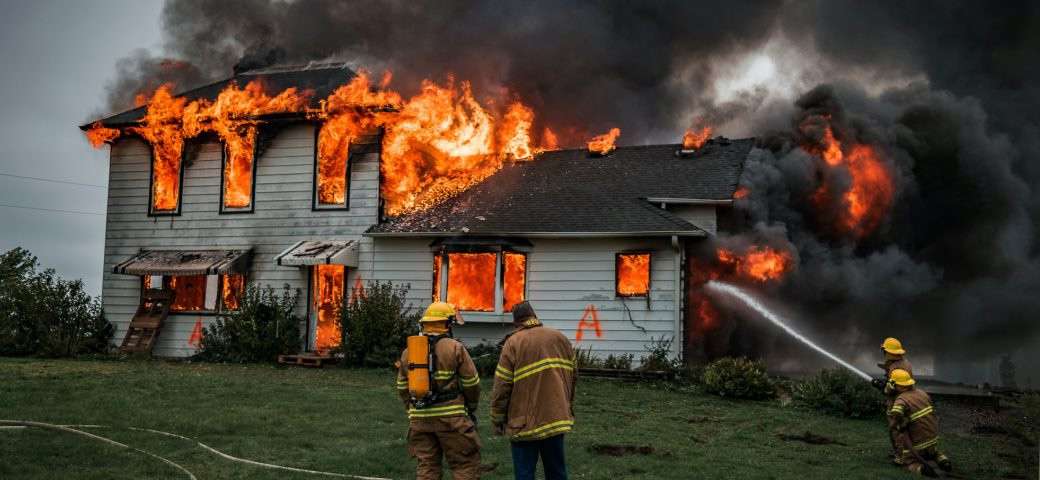Every year, homes burn to the ground because of preventable fire incidents. While some fires result from natural disasters, unfortunate accidents, and other uncontrollable variables, the vast majority of house fires can be easily prevented, curtailed, and extinguished before it’s too late.
How do you protect your home from a house fire reliably?
Table of Contents
Use Heaters Responsibly
Heaters are incredibly useful, especially in cold weather. But they also represent a fire risk. If they’re used irresponsibly, or if they suffer a malfunction without human intervention, they could easily spark a fire that could consume your entire structure.
These are some of the most important tips to follow when using space heaters:
- Place on low, flat surfaces. Keep your heaters placed low, flat, stable surfaces. If the heater falls over or comes into contact with flammable materials, it could easily create flames.
- Avoid high-traffic areas. Don’t place your heater in a space that’s frequently trafficked. If a person or animal in your household walks past it and unwittingly knocks it over, it could cause a problem.
- Plug directly into an outlet. Always plug your heater directly into an outlet rather than using an extension cord. Many extension cords and power strips cannot handle the extra current flow, presenting the risk of an electrical fire.
- Never leave a heater unattended. No matter how much trust you have in your space heater, never leave it unattended. It should be supervised at all times.
Maintain Your Fireplace
If you have a fireplace, you’ll need to use that responsibly as well, always keeping the fire attended and using the correct type of fuel. It’s also important to regularly maintain and inspect your fireplace; build-up in your flue or chimney could dramatically increase the risk of a fire, and any structural problems with your fireplace could cause an otherwise contained fire to spread.
Be Wary of Open Flames and Hot Appliances
Open flames and hot appliances are some of the most common causes of house fires, so use these items and participate in these activities responsibly.
- Candles and incense. About 7,400 house fires are started by candles every year, resulting in an average of 90 deaths, 670 injuries, and more than $291 million in property damage. When burning a candle or lighting incense, keep these items on a stable, flat surface, and never leave them unattended.
- Smoking. Smoking is an unhealthy habit that no one should practice, but if you must smoke, try to do it outside. Make sure your cigarettes are completely extinguished when you’re finished with them.
- Stovetops. Gas stoves produce open flames, but electric stoves produce just as much heat. Be especially careful when using your stove to heat grease or oil, and keep flammable materials like oven mitts or paper towels away from your burners.
- Appliances. Other appliances, like toasters and coffee makers, also produce a lot of heat. Do not use them unless you can supervise them.
Keep Fire Extinguishers Nearby
You should always have fire extinguishers nearby in case a fire breaks out. A typical household should have at least two, including one on every floor, one for the kitchen, and one near any area with a high fire risk (like in any room with a fireplace). Also, make sure these fire extinguishers are rated for the type of fire likely to break out, and familiarize yourself with the instructions for how to use them.
Change the Batteries in Your Smoke Detectors
Smoke detectors are your early warning system, giving you an opportunity to flee the house before it erupts in flames. Accordingly, you should maintain and test your smoke detectors regularly and change the batteries as needed.
Educate and Supervise Your Children
Even if you practice fire safety responsibly, there’s no guarantee your children are going to follow you or replicate your behaviors. Take the time to educate and supervise your children; teach them about the importance of fire safety and make sure they adhere to these principles before leaving them on their own.
Check Your Insurance Policy
Double-check your insurance policy to make sure you’re covered in the event of a fire. Insurance policies can be complicated, so ask questions if there’s anything you don’t understand.
Have an Evacuation Plan
Every household should have a clear, frequently practiced fire evacuation plan. If and when a fire breaks out, what do you do, where do you go, and how do you meet outside? Run fire drills to make sure everyone is capable of following these instructions.
Committing to better fire safety doesn’t take much time, money, or effort, but it could keep you and your family safe indefinitely. These strategies can help you prevent most structure fires – and rest easier knowing your house is protected.







More Stories
WWF and Lab-Grown Diamonds: A Sustainable Future
Craftsmanship Meets Consciousness: Lab-Grown Diamond Tennis Bracelets for the Discerning Buyer
Unveiling the Mysteries of Diamonds: Answering Your #1 Question